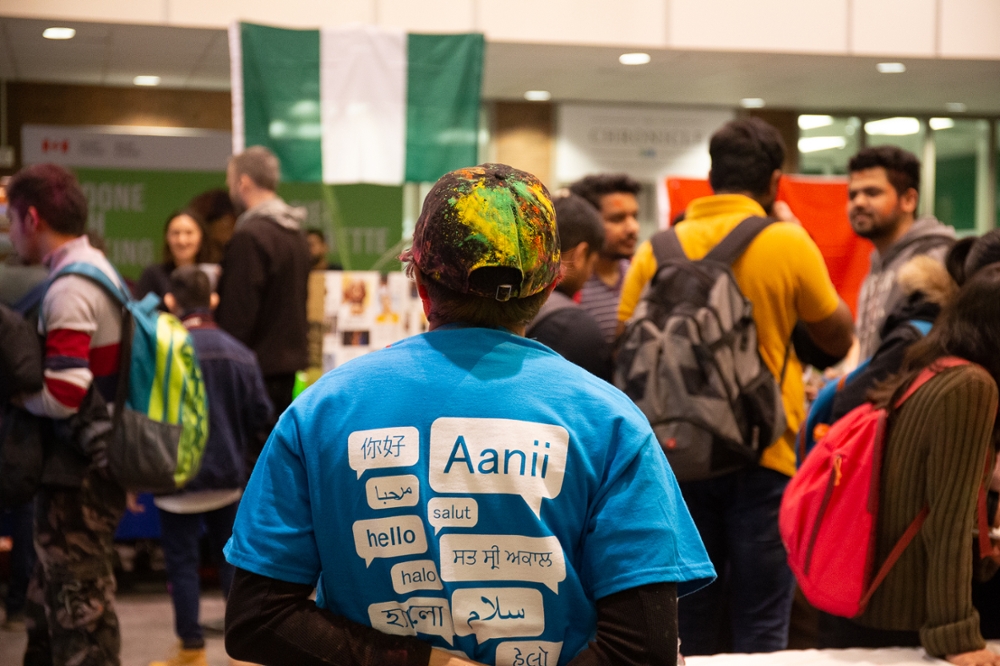Putting the YOU in university: Securing your health
January 21, 2021
This post is a part of a five-part series to help you make the most of your university experience. I have been able to put together a healthy number of suggestions you could use to shape your university experience to be great (and great for you). Earlier in the first part of this series, I muscled together some tips to help you secure your education. Now, time to loosen up now … it’s time to go about securing your health.
Every human has a unique minimum condition they need to keep their bodies at to ensure they perform at an optimum level. I will divide these into three categories: nutritional health, mental health and physical health.
Nutritional health (or health health)
Eat healthily. You don’t need to be a master dietician to eat healthily. What I usually do is split my meals 50:50. 50 percent fruits and/or vegetables, 50 percent anything else (except junk). This means the only way I can reduce the amount of vegetables I eat is by reducing my portions in general. This alone goes a long way in ensuring you are getting nutrients. Also, make sure you’re drinking lots of water (I aim for around two to three bottles every day) and you’re not becoming overly dependent on coffee. To make this specific to you, look at the meals you enjoy eating and draw up a flexible meal schedule around your classes so you don’t just eat at random and are able to generally be consistent in healthy eating and drinking.
Since examples are fun, I’ll give you one:
Thursdays are usually my busiest days so I have to be very conscious and strategic as to how and when I eat my meals. Let’s see what a typical Thursday is like for David...
A typical Thursday for David:
-
Breakfast (8:45 a.m.)
- One (1) bowl of oatmeal with 2% milk (skimmed milk is basically water in my opinion).
- If you’re not on the oatmeal train yet, this post might help convince you.
- One (1) serving of scrambled eggs.
- Two (2) boiled eggs.
- One (1) bowl of Fruit Salad (Watermelons, Melons, Papaya, Grapes).
- One (1) LARGE glass of water (try to avoid fruit juice).
- One (1) bowl of oatmeal with 2% milk (skimmed milk is basically water in my opinion).
-
Lectures (9:40 a.m. to 2 p.m.)
One (1) protein bar, a fruit smoothie (four-berry mix, with bananas and protein powder)
These are consumed at discretionary intervals during this three-hour lecture span
-
Lab (2:10 to 4 p.m.)
The food from the lecture period tends to carry me through my labs and besides, I’m usually way too zoned in to think about food. If the lab was happening physically, I definitely would not recommend carrying your food into the lab. Maybe step out for a fruit snack at best if you get hungry.
-
Dinner (5:30 p.m.)
- Two (2) servings of the meat available (preferably chicken).
- One (1) serving of a whole grain such as brown rice with seasoning and sauce
- (depends on my mood).
- One (1) bowl of vegetables: tomatoes, cucumbers, lettuce, BROCCOLI, mushrooms and raisins (I actually don’t like dressing on my salad so I eat it raw).
- One (1) teeny-tiny bowl of cereal + 2% milk (guilty pleasure).
- Yes, I eat cereal during dinner and I usually mix about four different cereals together: Raisin Bran, Vector, Rice Krispies (Brown Rice Version) and Corn Flakes.
- One (1) LARGE cup o’ water.
-
Church volunteering (6:30 p.m.)
I usually pack a sandwich on my way out of dinner. If I get hungry during this period I eat half of it, if not I just save it till I’m done
-
Snack (8:15 p.m.)
- A sandwich (Whole Grain Bread, Turkey, Cheddar, Tomatoes, Lettuce, BBQ sauce, Chipotle Sauce)
- A cup of my BodyKeyⓒ Chamomile & Tulsi Tea (a natural way to calm your nerves. Most people will never predict this but I’m a naturally hyperactive person).
-
Study session (8:30 p.m.)
At this point you must be wondering, does this dude eat every second of the day. The answer is, if I could I would. I’ll say I'm slightly fortunate in that I have a fast metabolism, but if that is not the case with you, don't feel bad at all; you don’t have to worry about randomly being hungry in the middle of a lecture!
Also I tend to have a snack by my side while I’m studying; most of the time it is a bag of my favorite Tortilla Chips.
-
Bedtime (11/11:30 p.m.)
Finally, a practice I recently imbibed is to NEVER eat past 9 p.m. Try it yourself and let me know how much healthier you feel.
All in all, this isn’t a strict schedule I follow but 70 per cent of the time, this is generally what I tend to eat. Because of the number of times I’ve eaten like this, I basically have this engraved into my head.
Mental health
Stay in contact with people. At some point in your life, take 30 mins to yourself and just think about trends you might have observed in your life in terms of your mood; what are the common scenarios that make you happy, sad, angry or stressed. Remember that it is not normal to be happy all the time. Humans are designed to experience a full spectrum of emotions, we are not robots. What you have control over is how you respond to these emotions. This is where things get specific to you. Let these questions guide you:
- When you are happy, how can you multiply this happiness and how can you spread this happiness to others?
- When you are sad, where do you seek motivation from? Who do you talk to? What commonly recurring scenarios make you sad?
- When you are angry, how do you best keep this feeling under control? What’s your preferred means of calming down? What has recently made you angry and how can you avoid it?
- When you feel stressed, what is your go-to means of blowing off steam? What usually gets you stressed (this might be a busy school schedule)? Who are some people you can ‘run the stress race’ with?
After thinking about these things during your 30 min self reflection session, you will begin to understand yourself better and begin to leave mental notes that will guide you in the right direction when these stimuli occur. I will give some personal examples to guide you:
When I feel happy, I multiply this happiness by making people laugh by cracking jokes, etc. I also sometimes do relevant favors for people and buy gifts for my family.
When I feel sad, I usually call my parents because they understand me best and know exactly the right thing thing (not a typo) to say that will cheer me up. Failing a test or quiz is an example of something that makes me sad.
When I feel angry, I usually make sure I come in contact with as few people as possible to make sure I don’t upset anyone due to my anger. My preferred way of calming down is going for a run. I basically run using anger as my drive (I am usually able to do two extra laps as a result) and I run till I tire myself out. At that point I have no strength left to be angry. A common scenario that gets me angry is a favorite sports team of mine losing a game that could easily have been won.
Having multiple tasks to complete for school usually gets me stressed. My way of blowing off steam is by taking a power nap. I usually wake up feeling like I’m starting a new day afresh. I usually make sure I do work with my study group to make sure we can all keep one another motivated.
Most importantly, one reason the ‘cool kids’ in society were cool was because they weren’t afraid to express themselves. If you’re feeling any of these kinds of emotions (happiness, sadness, etc.), make sure you talk to someone. This could be a friend, a professional therapist or even yourself.
Furthermore, here are some services that have helped me as well as a lot of people I know (feel FREE to use them, they’re FREE):
Student Mental Health Services:
905.721.3392 or studentlifeline@ontariotechu.ca
Drop in appointments are also available.
1.866.925.5454
Physical health
Sleep and exercise adequately. Need I say more? Of Course, I do :)
Sleeping
You need it more than you think you do my friend. My rule of thumb is to sleep at least seven hours regardless of when I sleep. It helps to be in bed before 11 p.m. The hours between 11 p.m. and 1 a.m. are the optimal times for your body to be asleep.
Here are some tips to get a better sleep:
- Throw your phone away before bed. Please. PLEASE.
- Pee before bed.
- Low or no lighting before bed.
- Good room temperature before bed.
- Don’t sleep on a full stomach.
- Set the alarm before bed - that’s how I roughly track my sleep. I’m not strict about that.
Waking up
Don’t do that five-alarms-in-a-row-nonsense (pretty please). If you understood sleep cycles you’ll understand that those 30 mins in between the 5 alarms are very much pointless. Wake up on your first alarm. Pat yourself on the back every morning by not hitting the snooze button.
One technique that I learnt from a YouTuber (Ali Abdaal) is to get up in a hurry and go pee and take a shower, and if you still feel like sleeping after that, you’ll have given yourself the permission to go back to sleep. Out of the 70+ times I’ve done that I’ve only felt the need to go back to sleep once! Try it.
Exercising
Notice how I forgot to mention picking up your phone in the last paragraph? That’s the same way you should forget to pick up your phone when you wake up every morning.
I hit the gym two to three times a week. I’m a cardio guy. I usually work on weights during the summer when the wear and tear on my body is less costly on my performance at school (since in school you basically work round the clock).
I run for fun using my Nike Run Club App as a way to track my speed, time and progress. Progress? Am I training for a competition? A very canadian “yes”, the race of life (such a corny statement). I get very happy and fulfilled when I break my PR (personal record) or I push through a very tiring lap, etc. Most of all, when exercising, always set goals so you’re not exercising for no reason.
My one kilometre time (approximately five laps around the Campus Recreation and Wellness Centre track) currently stands at 3:37 so whenever I get out there on the track, I know exactly what I’m trying to beat. My longer term goal is to hit 3:30 by the end of the winter semester and 3:15 by the end of the year. Since I’m a very busy person, I usually exercise first thing in the morning, but do what works for you. There’s no hard and fast rule to when you exercise in my opinion.
Some people have also asked me for tips when it comes to weight loss since I personally went on a weight loss program and have lost about four KG so far since December (currently at 79KG and aiming for 77KG). It’s very simple. Don’t overcomplicate it. Once you realize that there are MANY ways to achieve the same result you’ll stop stressing about what to do.
I personally started by following the diet plan I listed out earlier in the article with a strong emphasis on eliminating bad foods and emphasizing proteins and fruits and veggies. I further complemented this by using the BodyKeyⓒ app which gives you specific tips and meal plans plus it also has challenges. Finally, I stopped eating so late.
Notice how I didn’t say anything about exercise? That’s because 70% of your weight loss will mostly depend on your diet, not necessarily your exercise level. This is talking from experience not an article.
Essentially, all these things are very useful and fun to do, but why do it by yourself when you can do it with others. Sharing is caring right? Just make sure you do it with the right people, for YOU. Curious how? I’ll see you in the next episode: ‘Securing your Friends’.






